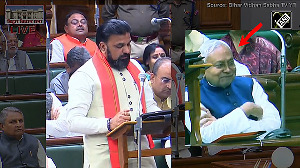The Prime Minister's Office is expected to have a tough time making up its mind on the right wages for workers under the National Rural Employment Guarantee Act (NREGA). For, the labour and rural development ministries have taken different positions on the matter.
For, the labour and rural development ministries have taken different positions on the matter.
A labour ministry note sent to the rural development ministry (MoRD) says the minimum wage notified in each state - often higher than the NREGA set one - has to be paid.
But MoRD has written to the PMO that the NREGA enactment has clauses that exempt it from all other laws, including the Minimum Wages Act. Hence, MoRD is not legally obliged to pay at any other rate.
These rival notes come in the wake of a letter from National Advisory Council chairperson Sonia Gandhi to Prime Minister Manmohan Singh that the NAC consensus was that each state's set minimum, no matter how high, must be paid under NREGA.
MoRD has made the additional point that if states are to decide the NREGA rates, it means Parliament loses its power to decide the allocation for this centrally-funded scheme.
Also, going by the labour ministry argument, contends MoRG, would make allocation planning impossible, as it would then vary on the basis of whatever the states decide on rates to be paid.
The relevant section of the NREGA Act is 6 (1), which says the Centre can decide the rates to be paid under the scheme and these wont be less than Rs 60 per day. MoRD hasn't revised the NREGA wage rates after January 2009, when it was Rs 100 per day.
One sequel is that the Andhra Pradesh government had actually challenged this rate as too low in the state high court.
And, the HC upheld this rate as illegal, since the state's own legal minimum wage was higher. MoRD sources say the ministry can appeal to the Supreme Court. Unless, of course, a decision is taken on non-legal grounds.
What NREGA has to say
6. (1) Notwithstanding anything contained in the Minimum Wages Act, 1948, the Central Government may, by notification, specify the wage rate for the purposes of this Act:
<li> Provided that different rates of wages may be specified for different areas:
<li> Provided further that the wage rate specified from time to time under any such notification shall not be at a rate less than Rs 60 per day.
28. The provisions of this Act or the Schemes made thereunder shall have effect notwithstanding anything inconsistent therewith contained in any other law for the time being in force or in any instrument having effect by virtue of such law.







 © 2025
© 2025